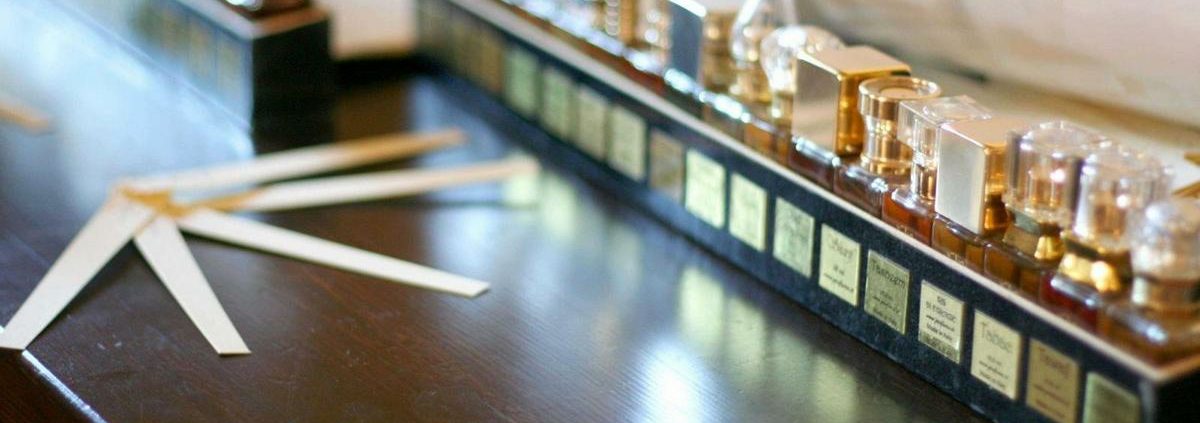
Why Choose Natural Perfumery?

The definition of natural perfume is simple: it is a perfume made of plant or animal extracts without any other ingredient.
How I become a natural perfumer
I did not really choose to become a natural perfumer or to make natural scents. It just came to me.
Initially, I bought indiscriminately the raw materials that the public clamored for without any idea about their real nature: musk, amber, violet, sandal, rose, patchouli, natural, and synthetic. I soon noticed that some of them caused me allergies and severe headaches, and I realized that these were synthetic ones.
On the other hand, while starting my business from Grasse in 1986, I bought the book Valnet on Aromatherapy and started straight away to use essential oils on myself and my friends. Although I focused on selling these pure essences as attars, as they do in the East, I started to experiment and witness their extraordinary healing power.
I realized that synthetic perfumery materials made me ill and that natural essences would heal me. I soon came to perceive their superior beauty as well. Unlike synthetic chemical materials, life was in them. They had wholeness, cohesion, and the power to arouse positive emotions.
Therefore, I dedicated my study and trade exclusively to natural ingredients.
I chose to make natural perfumes as someone chooses to work with precious metals and rare gems instead of plastic beads and pearls of colored glass. Natural essences are indeed olfactory jewels.
Price of natural fragrances
Natural extracts, essential oils, and absolutes are among Earth’s most expensive things. Consider that gold and diamonds last forever, while natural essences, some of which are more expensive than gold, last only for a few hours when applied to the skin for our pleasure. Five tons of rose petals make one kilogram of rose essence, millions of hand-picked jasmine or orange flowers…
As Luca Turin explained, mainstream fragrances simply cannot afford anymore to use them because of their price: “The big six perfumery firms are aroma chemicals manufacturers, and it is in their interest to keep naturals, with their attendant problems of price and quality fluctuations, to a bare minimum. Just how bare that minimum can be has become clear in the last five years, during which the cost of a «fine fragrance» formulation has gone down by half and the quality by nine-tenths. Good frags have almost disappeared: there are 500 launches each year, but only a dozen are worth smelling twice.”
The price of Natural fragrances is naturally higher than the mainstream ones because they are olfactory jewels made with olfactory gems that have a much higher cost than synthetic essences. Anybody may argue that he likes glass beads more than emeralds and rubies, but the superior beauty of gems over glass and plastic beads is not a question of opinion but of understanding. This is equally true for the natural ingredients that compose natural fragrances.
Animal scents
Man used the same animal pheromones long before the advent of modern perfumery. They are present in the traditional pharmacopeia. Scents were once used to heal.
Natural perfumers sometimes use animal pheromones, most of which are tinctures. When this is the case, we inform the customers by mentioning ” not vegan.”
Natural perfumery
When Luca Turin, the famous perfumery critic, wrote in 2006:
“There are now officially four kinds of perfumery: normal, niche, vintage and natural“,
he threw a bomb and initiated a worldwide process of recognition that is still going on but is mainly limited to the web.
Not many shops in our cities offer natural fragrances, but the number of “scents by nature” online shops is growing steadily.
Since 2006, the number of perfumers committed to making 100% natural scents has grown, and their presence on the web is unavoidable. They often propose classes about making natural fragrances, which fosters new vocations for natural perfumery.
It is an open-source world. Mainstream perfumery is a caste system.
In order to provide full information about my fragrances, I have published the list of all the ingredients that I use and, to avoid any trickery, the list of the ingredients that I do not use as well.
Our natural perfumes line:
“The Scents of the Soul“
More on Natural Perfumes
-
Introduction to natural perfumery: An explanation of what natural fragrances are and how they differ from synthetic fragrances
-
Ingredients in Natural Perfumes: An overview of the all-natural ingredients that are typically used in our fragrances, including essential oils, absolutes, and tinctures
-
Benefits of Natural Perfumes: A discussion of the many benefits of using natural fragrances, including their therapeutic properties, lack of toxic chemicals, and the fact that they are eco-friendly
-
How to Wear Natural Perfumes: Advice on how to wear natural fragrances to ensure they last longer, as well as how to layer scents for a more complex fragrance
-
Making Your Own Natural Perfumes: An to compose your own natural fragrances, including tips for blending different scents
-
Natural Perfumes for Different Occasions: Suggestions for natural scents that are appropriate for different people, occasions, seasons, and moods
-
Frequently Asked Questions: A list of common questions and answers about natural fragrances, including their longevity, safety, and toxicity
-
The natural perfumery trend (part one)
-
Composing a natural fragrance
-
How to make natural perfumes
-
Blog posts by AbdesSalaam Attar on Natural Perfumery
-
Our Essential Oils blog
-
Our Perfumery Forum
-
Philosophy of Perfume (part 3): Healing molecules
Thanks to those who helped in the worldwide recognition of natural perfumery












